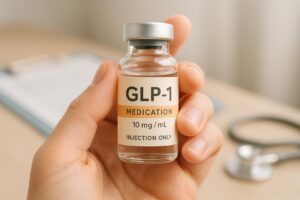When to Stop GLP-1 Before Pregnancy: Essential Guidance for Future Moms

Introduction
Did you know that nearly 1 in 8 adults in the United States has taken a GLP-1 receptor agonist, such as Ozempic or Wegovy, for weight management or diabetes? As these medications gain popularity, many individuals—especially women of childbearing age—are exploring their implications on fertility and pregnancy. The connection between GLP-1 medications and fertility has become a hot topic, and with the rising number of pregnancies reported among women using these medications, it’s essential to understand when to stop GLP-1 before pregnancy.
In this blog post, we will delve into the intricacies of GLP-1 receptor agonists, their effects on fertility, and the critical timeline for discontinuation before conception. Our aim is to equip you with knowledge that empowers your health decisions. We’ll cover several aspects, including how these medications can influence weight loss and fertility, the safety considerations during pregnancy, and expert recommendations regarding their use in anticipation of pregnancy.
As we navigate this topic together, we understand that many readers may have personal stakes in this information. Whether you are currently on a GLP-1 medication or just considering it, this post will offer valuable insights tailored to your journey. We believe in a transparent and supportive approach to health, and by the end of this article, you’ll have a clearer understanding of the relationship between GLP-1 medications and pregnancy, as well as the necessary precautions to take.
Scope of the Article
We will be addressing the following key topics:
- Understanding GLP-1 Receptor Agonists
- The Impact of GLP-1 on Fertility
- When to Stop GLP-1 Medications Before Pregnancy
- Safety Considerations During Pregnancy
- Optimizing Health for Pregnancy
- Consultation and Support Resources
By breaking down these areas, we aim to provide a comprehensive understanding of the topic, ensuring that you feel informed and equipped to discuss your health with your healthcare provider.
Understanding GLP-1 Receptor Agonists
GLP-1 receptor agonists have emerged as a revolutionary class of medications primarily used for managing type 2 diabetes and aiding weight loss. They mimic the action of glucagon-like peptide-1, a hormone that plays a crucial role in glucose metabolism and appetite regulation. Medications such as Ozempic, Wegovy, Mounjaro, and Zepbound have garnered attention for their effectiveness in facilitating weight loss—often resulting in significant reductions in body weight and improvements in metabolic health.
Mechanisms of Action
GLP-1 receptor agonists work by:
- Enhancing Insulin Secretion: They stimulate insulin release from the pancreas in response to elevated blood sugar levels, which is critical for individuals with diabetes.
- Slowing Gastric Emptying: This action prolongs the feeling of fullness after meals, reducing overall calorie intake.
- Suppressing Appetite: By acting on areas of the brain that regulate hunger, these medications can help manage cravings and promote healthier eating habits.
The Growing Popularity
The popularity of GLP-1 medications has surged, particularly as more individuals recognize the connection between obesity, metabolic health, and fertility. For many women, achieving a healthier weight through these medications has led to improved reproductive outcomes, sparking interest in their potential role in fertility enhancement.
The Impact of GLP-1 on Fertility
Interestingly, GLP-1 receptor agonists have been associated with improved fertility outcomes for some individuals, particularly those struggling with obesity-related infertility. Research has shown that weight loss of as little as 10% can significantly enhance fertility by restoring regular ovulation and hormonal balance.
Weight Loss and Fertility
Obesity can disrupt hormonal levels, particularly estrogen, which is crucial for regular menstrual cycles and ovulation. By promoting weight loss, GLP-1 medications may help restore these hormonal levels, thereby increasing the chances of conception. The SELECT trial demonstrated that a substantial percentage of participants using semaglutide achieved significant weight loss, which correlated with improved reproductive health.
However, while these medications can provide unexpected benefits, they also raise important questions regarding safety, particularly during pregnancy.
When to Stop GLP-1 Medications Before Pregnancy
For women considering pregnancy, understanding when to stop GLP-1 medications is critical. Current recommendations suggest discontinuing these medications approximately two months before trying to conceive. This timeline allows the body to clear the medication, ensuring that it does not influence fetal development should conception occur earlier than expected.
Why Two Months?
- Medication Half-Life: GLP-1 medications can remain in the body for a period even after stopping. By allowing time for the drug to be metabolized and eliminated from the system, we reduce potential risks during early pregnancy.
- Unplanned Pregnancies: Women may not immediately recognize pregnancy due to irregular cycles or other factors. Stopping the medication ahead of time provides a safeguard against exposure during the critical early development phase.
Individual Considerations
It’s essential to recognize that each individual’s situation is unique. Factors such as overall health, the specific GLP-1 medication used, and personal fertility history can all influence the appropriate timing for discontinuation. Therefore, we recommend consulting with a healthcare provider to establish a personalized plan.
Safety Considerations During Pregnancy
The safety of GLP-1 medications during pregnancy remains an area of ongoing research. Current FDA guidelines advise discontinuing these medications before conception due to limited data on their long-term effects on fetal development.
Risks and Findings
- Animal Studies: Some animal studies have indicated potential risks associated with GLP-1 medications, such as lower birth weights. However, it is unclear whether these findings directly translate to human outcomes, as such studies often do not account for the complexities of human pregnancies.
- Observational Studies: Recent observational studies involving pregnant women taking GLP-1 medications have not shown statistically significant increases in congenital malformations. However, the sample sizes in these studies are often small, and more extensive research is needed.
Recommendations
- Discontinuation: It is generally recommended to stop GLP-1 medications before conception and refrain from use during pregnancy unless advised otherwise by a healthcare provider.
- Breastfeeding Considerations: There are also recommendations against using GLP-1 medications while breastfeeding, as they can be excreted in breast milk.
Optimizing Health for Pregnancy
As we consider the implications of GLP-1 medications and their discontinuation, it’s important to focus on overall health optimization for pregnancy.
Lifestyle Modifications
- Balanced Diet: A nutrient-rich diet can support weight management and reproductive health. Incorporating whole foods, lean proteins, healthy fats, and plenty of fruits and vegetables can create a supportive environment for conception.
- Regular Exercise: Engaging in regular physical activity helps maintain a healthy weight and improves overall well-being, which is crucial when preparing for pregnancy.
- Emotional Support: Mental health plays a significant role in overall health. Seeking support from healthcare professionals or joining support groups can provide valuable resources during this transitional phase.
Consulting Healthcare Providers
Working closely with healthcare providers—such as obstetricians and specialists in obesity management—can help create a comprehensive plan that addresses both weight management and fertility goals. Regular check-ups and discussions about potential lifestyle changes can pave the way for a healthier pregnancy experience.
Consultation and Support Resources
At TrimRx, we are dedicated to providing personalized support for our clients navigating their weight loss journeys. For those considering GLP-1 medications or managing weight in the context of fertility, we encourage you to reach out for guidance. Our free assessment quiz can help determine eligibility for personalized weight loss programs and medications that may suit your needs.
- Take our free assessment quiz to determine if our prescription weight loss medications are right for you: TrimRx Assessment Quiz.
Additionally, consider our quick-access supplements to support your overall wellness during this journey:
Conclusion
Navigating the use of GLP-1 medications in the context of pregnancy is a crucial aspect of reproductive health that requires careful consideration. By understanding when to stop GLP-1 before pregnancy, we can make informed decisions that prioritize both our health and the health of future generations.
As we’ve explored, GLP-1 medications can offer significant benefits in weight management and fertility, but they also come with important safety considerations. By allowing adequate time for these medications to clear from our systems and focusing on overall health optimization, we can enhance our chances of a healthy pregnancy.
We encourage you to engage with your healthcare provider to discuss your unique situation, seek support from professionals, and take proactive steps toward achieving your health and fertility goals. Together, we can explore the best approach to prepare for a healthy and fulfilling pregnancy journey.
FAQ
Why is it necessary to stop GLP-1 medications before pregnancy?
Stopping GLP-1 medications before pregnancy helps reduce any potential risks during early fetal development, as these medications can remain in the body for a period.
How long should I wait after stopping GLP-1 medications before trying to conceive?
It is generally recommended to stop GLP-1 medications at least two months before attempting to conceive to allow sufficient time for the medication to clear from your system.
Are there any risks associated with taking GLP-1 medications during pregnancy?
Current research is limited, but some studies suggest potential risks such as lower birth weights. The FDA recommends discontinuation before pregnancy due to the lack of definitive safety data.
How can I optimize my health before pregnancy?
Focusing on a balanced diet, regular exercise, and mental well-being can significantly support your overall health and enhance your chances of a healthy pregnancy.
Where can I find more support for my weight loss journey?
At TrimRx, we offer personalized weight loss solutions and support. Consider taking our free assessment quiz to explore potential options tailored to your needs.

Transforming Lives, One Step at a Time
Keep reading
Tracking Progress With GLP-1: What To Measure
Learn which metrics to track on GLP‑1 therapy—weight, waist, blood sugar, lipids, side effects, and non‑scale wins—and how often to monitor them.
Fatigue Solutions for Ozempic and Wegovy Users
Hydration, protein-rich meals, light activity, and better sleep can reduce medication-related fatigue and help maintain energy during weight-loss treatment.
GLP-1 Medication Side Effect Checker
Worried about GLP-1 medication side effects? Use our free checker for Semaglutide, Liraglutide, and more to learn what to expect and stay informed!



